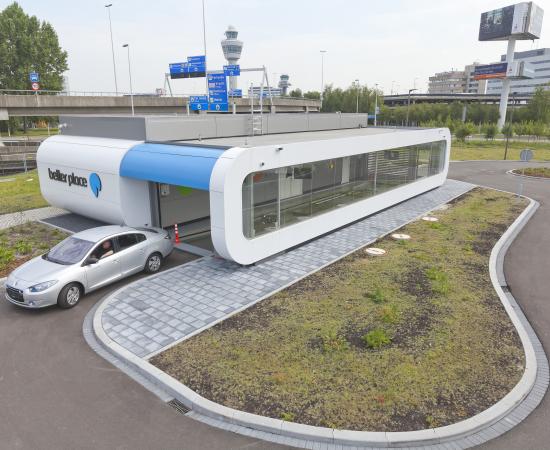Better Place Pulls the Plug on U.S. and Australia
In a sign of serious trouble, electric car services company Better Place is winding down its operations in Silicon Valley and Australia.

The company will focus on Israel and Denmark, where the company’s electric vehicle charging and battery-swapping infrastructure is already in place, Better Place says in a statement.
Israeli software executive Shai Agassi founded Better Place in 2005 to tackle one of the main problems with battery-electric vehicles—the limited driving range. From its base in Palo Alto, Calif., the company developed a business model where customers buy monthly driving plans that cover the cost of charging at home and at public stations. Customers can also drive up to automated battery-changing stations that remove depleted batteries for fresh ones in about the same amount of time it takes to fill a tank of gas.
The company raised $850 million, according to Forbes, from top-flight investors, including General Electric, HSBC, and Israel Corp. It launched projects in Israel, the San Francisco Bay area, Hawaii, Australia, Japan, and China and developed a communication system to direct customers to its car-charging network.
In the past several months, though, the company has had to scale back and seek a path to profits. The board removed founding CEO Agassi last fall and put in place the head of Better Place’s Australian operations, who himself was replaced after a few months.
Current CEO Dan Cohen said the company has successfully demonstrated its basic concept but it needs to sign on more customers and show that it has a “sustainable, scalable model.”
“To do so we are now focusing on realizing the full potential of what we have built, and that means concentrating our resources and energy in the near term, on Denmark and Israel, where we have customers on the road enjoying our switching and charging networks. At the same time, we had to make some difficult decisions on actions to be taken elsewhere in the world,” he said.
Better Place’s radically new business model—where car ownership is more like paying for a mobile phone plan—is an innovative approach to overcoming range limitations and the high cost of EV batteries to owners.
But the company clearly still needs to appeal to more drivers and it has only signed on Renault to build cars compatible with its battery-swapping stations. It business model also entails the significant cost of installing charging infrastructure.
Although it seems to have little choice, this retrenchment will serve to focus Better Place. Even though it was well funded, it took on many expensive infrastructure projects in a field—transportation—where change usually happens slowly.
Its fortunes are now tied to what happens in Israel and Denmark, where the driving distances are less than Australia, for example, and there appears to be significant government support for electric vehicles. It’s still an open question whether its subscription-based business model and battery-swapping system appeal to enough drivers to sustain a business. Now, Better Place’s ambitious idea will be put to the test.
Keep Reading
Most Popular
Large language models can do jaw-dropping things. But nobody knows exactly why.
And that's a problem. Figuring it out is one of the biggest scientific puzzles of our time and a crucial step towards controlling more powerful future models.
How scientists traced a mysterious covid case back to six toilets
When wastewater surveillance turns into a hunt for a single infected individual, the ethics get tricky.
The problem with plug-in hybrids? Their drivers.
Plug-in hybrids are often sold as a transition to EVs, but new data from Europe shows we’re still underestimating the emissions they produce.
Stay connected
Get the latest updates from
MIT Technology Review
Discover special offers, top stories, upcoming events, and more.